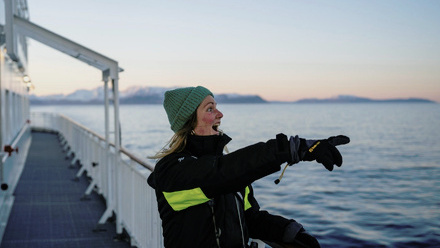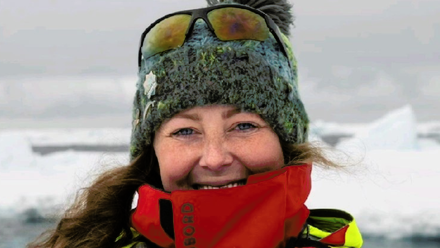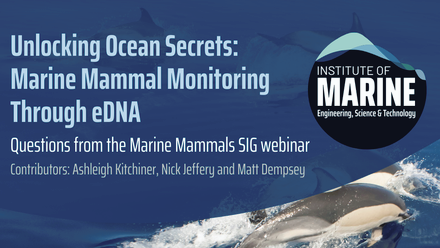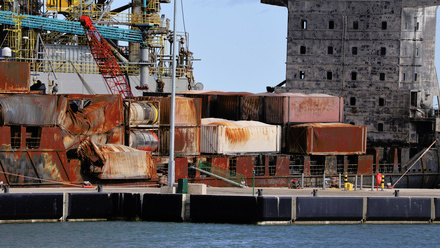Training the next generation of marine mammal observers
Observing and monitoring marine mammals is vital for lessening the human impact on these magnificent sea creatures.
For those looking to work with marine mammals, a career as a marine mammal observer (MMO) or passive acoustic monitoring (PAM) operator might be their ultimate goal. Marine mammal observers go to sea and monitor and record the presence and behaviour of marine mammals. This information is essential for ensuring our activities at sea, such as offshore renewable energy development, pose as little impact as possible.
“There’s a capacity shortage at the moment,” explains Ashleigh Kitchiner, Marine Mammal Special Interest Group member, noting the growth in offshore developments in recent years. “We have to think about the next generation and capacity building.”

Kitchiner is passionate about building capacity. As Co-Chair for IMarEST’s Sea Your Future initiative, she is helping to build a platform to share resources and create a supportive community for those navigating their ocean career, from early career professionals to career movers. In a personal and professional capacity, Kitchiner has been training people so “we have competent and confident [marine mammal observing] professionals offshore”.
Kitchiner has been training budding marine mammal professionals since 2020, first for the UK-based charity ORCA, which trains people for their annual marine mammal surveys, and now with Seiche Training to deliver their Joint Nature Conservation Committee (JNCC) accredited MMO course and the PAM L1 courses, among others.
And in 2024, Kitchiner worked alongside Morgana Alvarenga (BGP Offshore) with Seiche Training to provide training at the BGP Oceans Empowering Nigeria initiative to 20 Nigerian marine observing professionals.
"I deliver JNCC-accredited MMO courses, PAM L1, Marine Mammal Observer (MMO) – Arabian Marine Wildlife Course, and Protected Species Observer (PSO) courses [through Seiche],” says Kitchiner, explaining it offers courses and professional training for individuals and companies.
“I really enjoy teaching people, I really enjoy being asked interesting questions and thinking about things differently,” says Kitchiner. After the courses have finished, Kitchiner sometimes mentors people to help and support them as they look for work. “IMarEST is developing a member-to-member mentoring scheme, so people looking to work as marine mammal observers will be able to use that too.”
Read more: IMarEST preparing to launch new mentoring service.
Beyond core criteria
Although the training has to include specific points and meet certain requirements for it to be recognised by bodies that oversee observer guidelines, Kitchiner does have some flexibility: “I give my personal spin on certain slides – a bit more information about my personal experiences and hints and tips that aren’t in the content criteria.” As Chair of the Marine Mammal Observer Association (MMOA), Kitchiner also keeps abreast of the latest developments in marine mammal mitigation. “I always make sure that new content is added,” she confirms.
Kitchiner also notes that marine mammal observing isn’t necessarily a great fit for everyone: “When I do the training courses, I talk about the negatives as well as the positives, showing people the role so they can make their own decisions.”
For those considering taking a course, Kitchiner notes that the time commitment isn’t enormous. The marine mammal survey course with ORCA, for example, takes one day, a JNCC-accredited MMO course one and a half days, and a PSO two days. “If you’ve done your MMO course, you can do a half-day PSO bolt-on,” Kitchiner notes.
For students and early career marine mammal practitioners looking for funding for the courses themselves or equipment, such as binoculars, the MMOA, in collaboration with IMarEST, have created a bursary for aspiring marine mammal observers. “We’re going to give bursaries annually, up to the amount of £750,” enthuses Kitchiner.
Discover more about applying for the MMOA bursary.
Join IMarEST’s Marine Mammal Special Interest Group to discuss this and similar topics.
Tell us what you think about this article by joining the discussion on IMarEST Connect.
Newsletter image: a baby humpback whale plays near the water surface. Credit: Shutterstock; Inline image: Ashleigh Kitchiner talking at an event; credit: Nick Burton.






